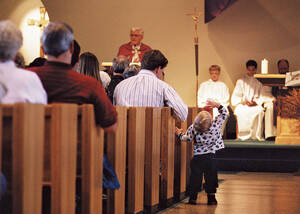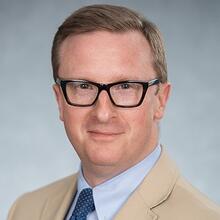The new translations of the Roman Missal will come to U.S. parishes on the first Sunday of Advent in 2011—translations that already have proved controversial. Since their shortcomings have been catalogued exhaustively in periodicals like America, there is no need to rehash them, except to recall that words like “ineffable” or sentences that run on for 88 words probably will not engage most parishioners. At this point it may be helpful to look at the situation from a different angle.
Since the time of Plato, the problem of politics has been to secure the place of justice in the city. The Catholic teaching that “all Christians in any state or walk of life are called to the fullness of Christian life and to the perfection of charity”(“The Dogmatic Constitution on the Church,” No. 40) gives some hope that justice might be attained. As a Catholic and a political theorist, I spend a lot of time thinking about how the practice of Catholic faith can offer solutions to political problems.
Many imaginative ways of integrating Catholic faith into social and political life have emerged in the last two centuries. They culminated in a renewed awareness of something that might surprise people outside the Catholic Church: the role of liturgy. In the 20th century, scholars of liturgical reform offered the following syllogism: Pius X tells us that the liturgy is the indispensable source of the true Christian spirit. Pius XI says that the true Christian spirit is indispensable for social regeneration. Hence the conclusion: The liturgy is the indispensable basis of Christian social regeneration.
Such lofty propositions were brought to practical levels by men like Msgr. George Higgins (1916–2002), who put the connection between liturgy and social transformation to work in the labor movement. Monsignor Higgins, a Chicago priest who headed the bishops’ social action department for decades, was known as “the labor priests’ priest.” His mentor, the pioneer in U.S. social action and liturgical renewal, Msgr. Reynold Hillenbrand (1897–1979), put the matter even more plainly: The Mass helps us “learn our oneness at the altar and to bring that oneness to the other relations of life.”
While the most important functions of the liturgy remain spiritual, other ways of thinking of liturgy are also important. Liturgy is “social” action, according to the “Constitution on the Sacred Liturgy” of the Second Vatican Council, which also describes it as “the fountain from which all [the church’s] power flows”; liturgy “inspires the faithful to ‘become of one heart in love.’” For these reasons, the council promoted the laity’s “full, conscious, and active participation” in the liturgy so that they may enjoy the “abundance of graces” available at Mass. Liturgy intensifies “the daily growth of Catholics in Christian living.” Full, conscious and active participation at Mass changes us; we can bring that change to the world.
The Altar and Daily Life
Archbishop Charles Chaput, O.F.M.Cap., of Denver, agrees. He recently described a “vocation of all Christian citizens” to “sanctify the world” through our actions. Catholics hear much from the bishops about the need for us to speak up in politics and about the evangelization of culture. Yet it is questionable whether such goals are served by an approach to liturgy (and, therefore, to social action shaped by Christian awareness) that purposefully seeks to separate what happens around the altar from what we Christians do in the rest of our daily lives. We should be aware of a danger: that the distance we create between liturgy and everyday life will widen, not shrink, the distance between Christian faith and the social order.
An instruction on the translation of the liturgy (“Liturgiam Authenticam,” issued by the Vatican Congregation for Divine Worship in 2001) criticized the vernacular translations in use as sometimes emphasizing “novelty or variety” over faithfulness to the tradition. This instruction, on which the new translations are based, identified a need for a liturgy spoken in a “sacral vernacular” different in “vocabulary, syntax and grammar” from “everyday speech.”
I am not defending the English translations in use today, which, in fairness, have deficiencies that deserve attention. But it is worth pointing out that those translations have brought two generations of lay people into a fuller awareness of what happens at Mass. To eschew the ordinary rhythms of spoken English because they are “prevailing modes of expression” or because people understand them readily seems unwise, especially considering that things spiritual may be lost. If parishioners are alienated from the action of the Mass by language that seems strange to them, then the church risks encouraging Catholics to isolate their faith from their lives at work, at school, at home and in the public square.
These translations are finished, the Holy See has approved them and they are coming to the parish. American bishops have plans to offer an “appropriate catechesis” to prepare the laity (which seems like an acknowledgment that there are problems with the new translations). Catholics must hope the bishops’ efforts succeed and pray that the bishops are aware of the potential social and political dangers of this liturgical transformation.
Catholics in the United States have spent a long time climbing out of a ghetto imposed by an immigrant past. It would be a shame if the coming approach to liturgy became a new ghetto of the church’s own choosing, one that encloses us in a language so precious that we hesitate to use it outside the church.









One could argue that the responsibility to help bring to the laity an understanding of the fullness of what is occurring at Mass is not the function of the translation. The function of "the translation" is to be loyal to the original Latin. “Et cum spiritu tuo” never meant “and also with you”, and it never will. There is a difference, and now we have a great opportunity to explain what it is.
Is it not a bit elitist of us to worry that the laity aren’t capable of understanding the original (often more scriptural) translation?I would counter that the responsibility to bring an increased understanding of the fullness of the meaning of the Eucharistic liturgy is the function of catechesis, from the ambo, in the classroom and in the hallway. We can worry about whether our translations are attractive to modern ears, or we (clergy and laity alike) can embrace the responsibility of making sure we all are growing in a fuller understanding of what the Eucharistic celebration means theologically. If in fact we are being successful with that job, then the “translation” of that meaning to our lives at home and at work might be all the more simple.
Given what we believe is happening in the Eucharistic liturgy, is it wrong that we might use language during it that we would not hear on the street, in a bus terminal or at the local sporting event? I would think more precious language would be exactly what is called for.As challenging as the new translation may be to some, and as much as some would have desired a different process, the author is right; it will soon be here. The attitudes of those responsible for its implementation will “translate” into the attitudes of the laity who receive it. I believe it presents us with a great opportunity to enthusiastically engage in the kind of catechesis which will not only increase and reinforce an understanding of our faith, but also simply by being a change, it can draw attention and thus increased interest and appreciation to that which may for some have become mechanical and stale.
As a boy I can remember the days when the mass was said in Latin. It was a very difficult task for a young boy to reflect and grow in the faith when the meaning was clouded by a foreign tongue. When English began to be used as the medium to communicate I was better able to grow in my faith by reflecting upon the wisdom of the mass.
It appears that the leadership of the church was not successful in their desire to returning to Latin as the language to communicate the mass. Instead they were successful in changing the words of English into a foreign tongue that the lay people cannot understand.I wish the leadership in the United States was as strong as the many countries that rejected this initiative. While our young are adopting new approaches to communicate through social media, the church is attempting to cloud our ability to understand. But the church will survive this change. The question is will we become better shepherds or will the church become more irrelevant to future generations?
Is someone suggesting that Christ spoke in some sort of arcane "sacral" way that was very different from the everyday (and very rich) speech, vocabulary and syntax of his listeners? I don't think so. Surely the best Biblical translations reflect the clarity and directness of Christ in speech. Even questions about his parables were not about his choice of unusual – and unused – words. Some of the new revision wording seems "precious" in a way that smacks of the sort of alienating religious jargon that that merely obfuscates. Some of the "new" phraseology is never heard in common American usage, including among the most literate. The almost random insertion of some unfamiliar words and phrases into passages well-known, well-understood, and well-loved over generations seems to work more like linguistic (and liturgical) speed bumps, disrupting the ebb and flow of understanding and devotion.
As a sociologist, I note that in the U.S. our shifting demographics mean a disproportionate aging population for decades ahead, yet the pastoral difficulty for aging Catholics to adapt to these unfamiliar and sometimes oddly contrived new words and phrasings has been blithely ignored. Nursing home residents, even those with some dementia and other difficulties still respond well to the current Mass liturgy. "Catechesis" for these thousands of aging and infirm faithful may be very frustrating for all concerned. Cardinal Newman, in another context, once pointed out the distinction between "ineffable" and "unspeakable," a distinction which may be pertinent here. I am sure that the committees worked very hard, and with holy intentions, and that we will struggle obediently with implementation problems as best we can. But we can’t help wondering what might have been.
The new language used is quite similar to the language that was used for my first communion. I have no reason to believe that this will enhance our worship. It does not "bring joy to my heart." It is a power play so we can think of the hierarchy as powerful.
I can only understand the logic of having language that is "sacred and otherworldly" when the hierarchy issues a public chastisement of Jesus for using such banal and contemporary language and imagery when preaching and telling parables."the church risks encouraging Catholics to isolate their faith from their lives at work, at school, at home and in the public square"
OR the church risks encouraging people to bring more sacred venacular into those same settings.
http://thegubbioproject.org/video.html
"here is how my parish celebrates the liturgy. translations won't matter much. short video
http://thegubbioproject.org/video.html"
Nice. Very poor neighborhood? Why the sanctuary? No other place available, or supervisable?
The Ite Missa Est (gasp yes Latin oh my goodness!) is the sending forth to witness to the encounter with Christ's Presence in the liturgy via the corp/spiritual works of mercy and the Beatitudes all gifts from on high. Latin is our common sacred language which Vatican II had no desire to eliminate, a sign of unity in an age where people are overdosing on particularisms of place.
The translation should give us what the Church actually prays in her liturgy and not paraphrases or made-up prayers which is what we have now often in office-memo prose. But then the now-discarded standard (if you can call it that) of translation "dynamic equivalence" is a model of equivocal language which can then be used to justify all kinds of mischief.